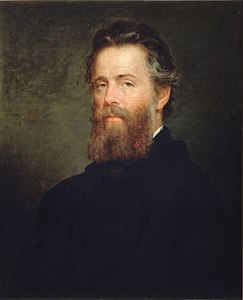The March to the Sea
Herman Melville 1819 – 1891
Not Kenesaw high-arching,
Nor Allatoona's glen--
Though there the graves lie parching--
Stayed Sherman's miles of men;
From charred Atlanta marching
They launched the sword again.
The columns streamed like rivers
Which in their course agree,
And they streamed until their flashing
Met the flashing of the sea:
It was glorious glad marching,
That marching to the sea.
The brushed the foe before them
(Shall gnats impede the bull?);
Their own good bridges bore them
Over swamps or torrents full,
And the grand pines waving o'er them
Bowed to axes keen and cool.
The columns grooved their channels.
Enforced their own decree,
And their power met nothing larger
Until it met the sea:
It was glorious glad marching,
A marching glad and free.
Kilpatrick's snare of riders
In zigzags mazed the land,
Perplexed the pale Southsiders
With feints on every hand;
Vague menace awed the hiders
In forts beyond command.
To Sherman's shifting problem
No foeman knew the key;
But onward went the marching
Unpausing to the sea:
It was glorious glad marching,
The swinging step was free.
The flankers ranged like pigeons
In clouds through field or wood;
The flocks of all those regions,
The herds and horses good,
Poured in and swelled the legions,
For they caught the marching mood.
A volley ahead! They hear it;
And they hear the repartee:
Fighting was but frolic
In that marching to the sea:
It was glorious glad marching,
A marching bold and free.
All nature felt their coming,
The birds like couriers flew,
And the banners brightly blooming
The slaves by thousands drew,
And they marched beside the drumming,
And they joined the armies blue.
The cocks crowed from the cannon
(Pets named from Grant and Lee),
Plumed fighters and campaigners
In the marching to the sea:
It was glorious glad marching,
For every man was free.
The foragers through calm lands
Swept in tempest gay,
And they breathed the air of balm-lands
Where rolled savannas lay,
And they helped themselves from farm-lands--
As who should say them nay?
The regiments uproarious
Laughed in Plenty's glee;
And they marched till their broad laughter
Met the laughter of the sea:
It was glorious glad marching,
That marching to the sea.
The grain of endless acres
Was threshed (as in the East)
By the trampling of the Takers,
Strong march of man and beast;
The flails of those earth-shakers
Left a famine where they ceased.
The arsenals were yielded;
The sword (that was to be),
Arrested in the forging,
Rued that marching to the sea:
It was glorious glad marching,
But ah, the stern decree!
For behind they left a wailing,
A terror and a ban,
And blazing cinders sailing,
And houseless households wan,
Wide zones of counties paling,
And towns where maniacs ran.
Was it Treason's retribution--
Necessity the plea?
They will long remember Sherman
And his streaming columns free--
They will long remember Sherman
Marching to the sea.
(December, 1864.)
Font size:
Submitted on May 13, 2011
Modified on March 23, 2023
- 2:30 min read
- 194 Views
Quick analysis:
| Scheme | abababcdadADefefexxdgdAd chchchxdadAd ijijixxdxdAd akakakldcdAd mnmnmncdgdAD cococoxdadAd apaxapldLdLd |
|---|---|
| Closest metre | Iambic tetrameter |
| Characters | 3,335 |
| Words | 494 |
| Stanzas | 7 |
| Stanza Lengths | 24, 12, 12, 12, 12, 12, 12 |
Translation
Find a translation for this poem in other languages:
Select another language:
- - Select -
- 简体中文 (Chinese - Simplified)
- 繁體中文 (Chinese - Traditional)
- Español (Spanish)
- Esperanto (Esperanto)
- 日本語 (Japanese)
- Português (Portuguese)
- Deutsch (German)
- العربية (Arabic)
- Français (French)
- Русский (Russian)
- ಕನ್ನಡ (Kannada)
- 한국어 (Korean)
- עברית (Hebrew)
- Gaeilge (Irish)
- Українська (Ukrainian)
- اردو (Urdu)
- Magyar (Hungarian)
- मानक हिन्दी (Hindi)
- Indonesia (Indonesian)
- Italiano (Italian)
- தமிழ் (Tamil)
- Türkçe (Turkish)
- తెలుగు (Telugu)
- ภาษาไทย (Thai)
- Tiếng Việt (Vietnamese)
- Čeština (Czech)
- Polski (Polish)
- Bahasa Indonesia (Indonesian)
- Românește (Romanian)
- Nederlands (Dutch)
- Ελληνικά (Greek)
- Latinum (Latin)
- Svenska (Swedish)
- Dansk (Danish)
- Suomi (Finnish)
- فارسی (Persian)
- ייִדיש (Yiddish)
- հայերեն (Armenian)
- Norsk (Norwegian)
- English (English)
Citation
Use the citation below to add this poem to your bibliography:
Style:MLAChicagoAPA
"The March to the Sea" Poetry.com. STANDS4 LLC, 2024. Web. 19 Apr. 2024. <https://www.poetry.com/poem/19121/the-march-to-the-sea>.



Discuss the poem The March to the Sea with the community...
Report Comment
We're doing our best to make sure our content is useful, accurate and safe.
If by any chance you spot an inappropriate comment while navigating through our website please use this form to let us know, and we'll take care of it shortly.
Attachment
You need to be logged in to favorite.
Log In